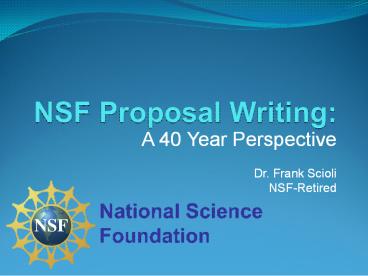NSF Proposal Writing: - PowerPoint PPT Presentation
1 / 16
Title:
NSF Proposal Writing:
Description:
A 40 Year Perspective Dr. Frank Scioli NSF-Retired How to develop a proposal Develop your bright idea Frame your idea as a question or puzzle Take stock of how other ... – PowerPoint PPT presentation
Number of Views:290
Avg rating:3.0/5.0
Title: NSF Proposal Writing:
1
NSF Proposal Writing
- A 40 Year Perspective
- Dr. Frank Scioli
- NSF-Retired
2
How to develop a proposal
- Develop your bright idea
- Frame your idea as a question or puzzle
- Take stock of how other scholars have addressed
(or neglected) your question - Prepare a brief concept paper
- Discuss with mentors colleagues
- Revise in light of feedback
3
How to develop a proposal
- Take steps toward the project
- How will you tackle your question?
- Refine your argument
- Refine plans for evaluating argument
- What resources will you need?
- How can you make preliminary inferences about
answers to your question (e.g., via a pilot
study)?
4
How to develop a proposal
- More steps toward the project
- Discuss with mentors colleagues
- Contact PIs working on relevant projects
- Consult mentors, colleagues, SROs to identify
potential funding sources - Revise in light feedback
- Present to mentors, colleagues, students
- Revise again ( again)
5
What makes proposal review well NSF Political
Science
- Clear questions
- Argument speaking to scholarly debates
- Clear hypotheses
- Sound design for measuring concepts, gathering
evidence/data - Outline for analytic strategy data analysis
- Pilots
6
How to turn work on the proposal into progress in
the research itself
- Incorporate feedback at every step
- Even when setbacks occurs
- Exploit lessons from preliminary findings
- Be willing to adapt and change ideas
- Obviously use reading and writing for proposal
as input into project itself
7
Targeting different funding sources
- Cast a wide net
- Use your SRO and funding search engines to
identify funding entities - Keep in mind diverse
- Rules
- Sets of reviewers
8
What makes proposal review well at NSF Two
review criteria
- Intellectual Merit
- Broader Impacts
- Importance
- Creativity originality
- Transformative?
- Conception organization
- Qualifications
- Access to resources
- Training
- Diversity
- Infrastructure
- Dissemination
- Societal benefits
9
Tips for preparing proposals that review well
- Discuss ideas with colleagues and mentors
- Contact PIs working on relevant projects
- Develop preliminary data
- Consult- exploit- your institutions SRO
- Work with your SRO on budget
- Consult such NSF source as Grant Proposal Guide
- http//www.nsf.gov/publications/pub_summ.jsp?ods_k
eygpg11001
10
New implementation of long-standing policy
- NSF policy
- Investigators are expected to share with other
researchers, at no more than incremental cost and
within a reasonable time, the primary data,
samples, physical collections and other
supporting materials created or gathered in the
course of work under NSF grants, Grantees are
expected to encourage and facilitate such
sharing. - (p VI-8, Award Administration guide, NSF 10-1)
11
New implementation Data management Plans
- New implementation
- First step more comprehensive approach to data
- Designed to address trends and needs in era of
data-driven science - NSF wants to avoid a one-size-fits-all approach
to address the issue of data sharing - As of Jan 2011, NSF is requiring that all
proposals include a data management plan in the
form of a Supplementary Document (maximum of 2
pages)
12
Data Management Plans (contd)
- The DMP
- Needs to address two topics
- The data to be generated by the research
- The plan for managing the data
- May include only the statement that no detailed
plan is needed, as long as the statement is
accompanied by a clear justification - FAQs http//www.nsf.gov/bfa/dias/policy/dmpfaqs.j
sp - Also http//www.nsf.gov/dir/index.jsp?orgSBE
13
Data Management Plans (contd)
- What are data for purposes of DMP?
- May include, but not limited to data,
publications, samples, physical collections,
codebooks, software and models - Will be determined by the community of interest
through peer review and program management - What does managing sharing data imply?
- Immediate access?
- not necessarily. The expectation is that all
data will be made available after a reasonable
length of time, as determined by the
community of interest through the process of peer
review and program management.
14
Data Management Plans (contd)
- What does managing sharing data imply?
- Access right after analysis completed?
- No One standard of timeliness is to make the
data or samples accessible immediately after
publication. However, what constitutes a
reasonable length of time will be determined by
the community of interest through the process of
peer review and program management. - Particular requirements for archiving?
- No. If appropriate, your DMP should describe
repositories for archiving and providing access
to others. What constitutes reasonable archiving
and accessibility will be determined by the
community of interest through peer review and
program management.
15
Data Management Plans (contd)
- What does managing sharing data imply?
- Costs of implementing DMP in budget its
justification? - Yes. As long as the costs are allowable in
accordance with the applicable cost principles,
and necessary to implement the DMP, such costs
may be includedin the proposal budget, and
justified in the budget justification. - Human subjects?
- Such data must be maintained released in
accordance with appropriate standards for
protecting privacy right maintaining the
confidentiality of respondents.
16
Proposal Process Timeline
Div. Dir. Concur
Award
Proposal received by NSF
6 months
90 Days
30 days
Proposal Preparation Time
Review of Proposal
PO recommend
DGA Review Processing of Award































